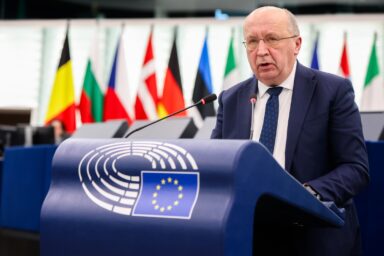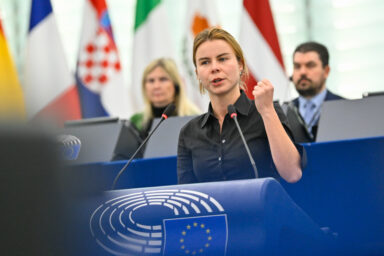The European Union is unlikely to build a “wall“ to keep cheap Russian drones from flying into European airspace. The idea itself will not fly — before it could take off in earnest, German defence minister Boris Pistorius grounded it at the Warsaw Security Forum.
As Russia escalates military tensions with multiple incursions of NATO member countries‘ airspace, European political heavyweights assembled in Warsaw on Monday, 29 September to discuss how to stop the Kremlin. Ukraine’s president, Volodymyr Zelenskyy, addressed the Warsaw Security Forum by video, asking to build a joint Ukraine-EU anti-aircraft defence system, and offering to share expertise.
Too long to build
“The response must be joint, fast and leave no opportunities unused,” the Ukrainian president said. Ukrainian forces have honed air defences through relentless Russian attacks—experience European militaries lack.
The forum saw EU Defence Commissioner Andrius Kubilius advocating for the creation of a so-called drone wall that would prevent Russian (or other) drones from threatening Europeans. The first meeting of the two-day event took place on Monday. Mr Kubilius declared last week: “Russia is testing the EU and NATO. And our response must be firm, united, and immediate.”
Alas, it was not. German defence minister Boris Pistorius cast doubt on the plans to build the drone wall along NATO’s eastern flank, cautioning that expectations must be managed. “We are not talking about a concept that will be realised in the next three or four years,” he said at the forum.
You might be interested
Ten per cent of GDP?
Mr Pistorius stressed the need for flexible procurement as drone technology evolves rapidly. His scepticism clashes with urgency from eastern states: drones breached Polish, Romanian, Danish and Norwegian airspace in recent weeks, while Russian jets entered Estonia’s.
Commissioner Kubilius had claimed the wall could be ready within a year. Last week he convened a meeting with Bulgaria, Estonia, Finland, Latvia, Lithuania, Poland, Romania, Hungary and Slovakia to discuss it. The European Commission is finalising technical and financial details ahead of an informal leaders’ summit in Copenhagen.
The war in Ukraine is just one part of that terrible project that emerges in the world from time to time… to enslave people. — Donald Tusk, Poland’s Prime Minister
Dutch defence minister Ruben Brekelmans backed swift action: “We need to cooperate with Ukraine and be much quicker than we are right now.” He criticised using €100m F-35 jets to down €10k drones as wasteful.
The provocation calculus
Yet replicating this without wartime pressure poses challenges. Estonia’s defence minister, Hanno Pevkur, warned that Europe risked spending 10 per cent of defence budgets during peacetime.
Mr Pistorius and Mr Kubilius agree that Russian aggression is intensifying. “Russia is becoming more and more of a threat to NATO,” the German minister said. Mr Zelenskyy framed incursions as Kremlin probes: “Russia is testing to see how far it can go.” A commission paper published on Monday called for “special urgency” on the drone wall and an “eastern flank watch” system, citing “continued military aggression against Ukraine” and airspace violations.
We talk about months and even years: we don’t have time. — Ruben Brekelmans, Dutch defence minister
The bloc’s executive arm wants expedited defence-industrial co-operation. Poland’s prime minister, Donald Tusk, framed the stakes globally: “The war in Ukraine is just one part of that terrible project that emerges in the world from time to time… to enslave people.” He warned that losing would imperil future generations.
Alliance anxiety
Divisions linger over balancing ambition with realism. Mr Pistorius argued that Europe must prioritise “capabilities and capacities” over unproven projects. Yet eastern leaders demand tangible safeguards. Poland, which recently agreed to host Ukrainian drone trainers, backs Mr Zelenskyy’s proposed joint air-defence shield. “Ukraine can counter all kinds of Russian drones and missiles,” he asserted. “If we act together…we will have enough weapons and production capacity.”
Germany’s defence chief urged regulatory reforms to boost EU-Ukraine defence ties. “Europe’s and Ukraine’s defence industry must work together more closely,” he said. The Dutch and Baltic states want immediate counter-drone investments. But with Russia exploiting gaps—deploying cheap drones and commercial ships as launchpads—the pressure is acute. As Mr Brekelmans’ warned: “We talk about months and even years: we don’t have time.”











